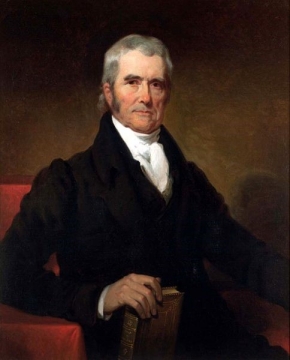You are here
Circuit Court Opinions:
Chief Justice John Marshall, United States v. Maurice (1823)

United States v. Maurice, 26 F. Cas. 1211 (C.C.E.D. Va. 1823) (No. 15,747) [Fifth Circuit]
In Maurice, Chief Justice Marshall provided the first judicial interpretation of the term “officers of the United States” in the Appointments Clause of the Constitution. Pursuant to a statute authorizing the president to have fortifications constructed, the secretary of war appointed James Maurice as an agent of fortifications. The government alleged that Maurice failed to disburse funds of which he had come into possession and had therefore defaulted on a performance bond, i.e., a guarantee that specified duties would be carried out, backed by a promise to pay those to whom the duties were owed in the event of a default. In his defense, Maurice claimed that the bond was void because his office had no legal existence and therefore could not have had any duties to which he was bound. His defense rested on the fact that he had not been nominated by the president and confirmed by the Senate as the Appointments Clause required for officers of the United States. Moreover, because the fortification statute did not mention the hiring of an agent of fortifications, the position had not been “established by law,” as the clause also required.
In interpreting the clause, Marshall reasoned that while all officers were employees of the government, not all employees of the government were necessarily officers. Someone performing duties for the government pursuant to a contract, he explained, should not be considered an officer. In contrast, a person appointed to perform duties prescribed by the government rather than by contract, and whose duties were continuous even if the person performing them changed, was properly deemed an officer. Marshall also emphasized the importance of Maurice’s duties, which included disbursing money and making contracts on behalf of the government, in concluding that he was an officer and that his position should have been established by law.
Marshall therefore ruled that Maurice’s appointment was unconstitutional. This conclusion did not absolve Maurice of his duty to disburse public money in his possession, however, nor did it invalidate the bond. The defendants’ plea contained no allegation that Maurice’s duties were unlawful or that the illegality of his appointment impeded him from performing them. If Maurice had been unable to perform his duties, Marshall asserted, he would have been subject to the same obligation to return the money as would anyone to whom public money was given by mistake. “If, then, this appointment be contrary to the policy of the law, the repayment of the money under it is not, and a suit may, I think, be sustained to coerce such repayment on the bond given for that purpose,” he wrote. The employee-officer distinction under the Appointments Clause, determinative of which positions must be filled by presidential nomination and Senate confirmation, has continued to be the subject of federal jurisprudence.
